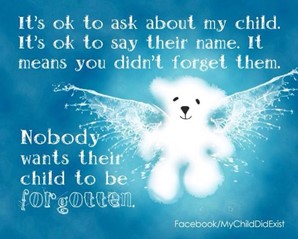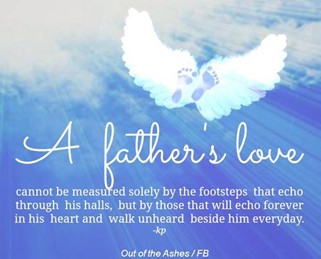|
May arrives with a sense of renewal and hope as snow and cold fade away and are replaced by the arrival of spring. The world is born anew. Spring, however, is often a challenging time for the bereaved. May is associated with International Bereaved Mother’s Day (first Sunday in May) and Mother’s Day (second Sunday in May). In my previous blog this month, I shared some thoughts around the incredibly painful experience for bereaved parents of surviving Mother’s Day. June is now just around the corner bringing along with it, Father’s Day. OCCASIONS Special occasions and traditional holiday celebrations present a difficult time for families who have lost a child. For those who are grieving, the emphasis on family and celebration can be painful and exhausting. Many holiday traditions are also strongly associated with birth and parenthood which can be too much for a family coping with pregnancy or infant loss to bear. Social media feeds and television are filled with joyous images of families and their children. For immediate/extended family and friends, it is also difficult to know how to best approach the painful subject of perinatal loss in the context of the joy that occasions and holidays traditionally bring. EXTENDED FAMILY AND SOCIAL NETWORKS Thinking more broadly – not just in the context of traditional holidays and occasions, perinatal loss affects, to varying degrees, everyone in the bereaved parents immediate and extended family and also in their broader social networks. PARTNERS AND RELATIONSHIPS We all know that grief is a completely unique experience for everyone, and couples may often find that their feelings and reactions around a perinatal loss do not ‘line up’. One partner may want to talk often about their feelings and the loss whereas the other wants to seemingly ‘get back to normal’ as quickly as possible and bury their grief. These divergent ways of coping can often cause strain on a relationship – strain that is made more difficult to navigate when both partners are already grieving the loss of their child. Reference CHILDREN AND SIBLINGS Most people would say of children, ‘they are so resilient’, however, children are generally profoundly affected when their parents are grieving. In terms of perinatal loss, children experience a twofold loss: The little brother or sister that they were expecting to welcome and their parents as they knew them prior to the grief they are now experiencing. For parents, finding the right way and the right time to tell their child/children that their sibling has died is challenging. Not only are parents struggling through their own grief, but they must then also somehow find a way to explain and support a sibling who is also mourning a great loss. Reference GRANDPARENTS As with the siblings of a baby or infant who has died, Grandparents often experience twofold grief: Grief for their longed-for grandchild and pain for their own child whose baby has died. They may feel helpless by their inability to lessen their child’s sorrow and grief. Grandparents may also not know how to express that they still want to see and hold the baby and/or take part in celebrating the baby’s life, no matter how short. Tommy’s, together for every baby note: “As grandparents you’ll not only be grieving the death of your grandchild, but you will also feel pain for the parents, especially your own child. It can be distressing to see your own daughter or son coping with the devastating loss of their baby. Grandparents have told us that they feel powerless to know what to do, or how to help.” Finally, for some grandparents, this new loss may also evoke painful memories of a perinatal loss they themselves may have experienced (sometimes undisclosed) for which they did not receive adequate support. Reference FRIENDS, COLLEAGUES, AND EXTENDED FAMILY Loss parents will tell you that losing a baby is one of the most devastating and traumatizing experiences that anyone can ever go through. For friends and colleagues, it is often extremely hard to know what to say or how to support someone who is suffering due to a perinatal loss. There is a great fear of ‘saying the wrong thing’ and causing more pain. In my own conversations with loss moms and dads, however, most parents have told me that having friends and family acknowledge and validate their loss, truly listen and just be there for them is always better than not saying anything at all. Reference FATHERS AND NON-BIRTHING PARTNERS We’ll be focusing in much more depth on how dads cope with Father’s Day after perinatal loss in our June blog but as a lead into that topic it’s important to note that all too often, dads and non-birthing partners are overlooked when their unborn child, or baby dies. They are frequently asked, “how is your partner doing?” but family and friends often forget to ask the bereaved father/non-birthing partner how they are doing. Fathers of Loss highlights that dads and non-birthing partners grieve deeply too and need their friends, family, and the wider community to support them. They may often feel unable to share their own grief, anxiety and fear because they want to ‘be strong’ for their partners. Societal pressure around the belief that “men don’t share” often dissuades fathers from getting the support they need. Your Health Matters posted the following advice from a bereaved father on their website:
Please stay tuned for our June blog focusing on coping with Father’s Day after loss and as always, on behalf of everyone at the Ottawa Butterfly Run … We see you. We hear you. We are here to support you
0 Comments
Your comment will be posted after it is approved.
Leave a Reply. |
Archives
April 2023
Categories
All
|





 RSS Feed
RSS Feed